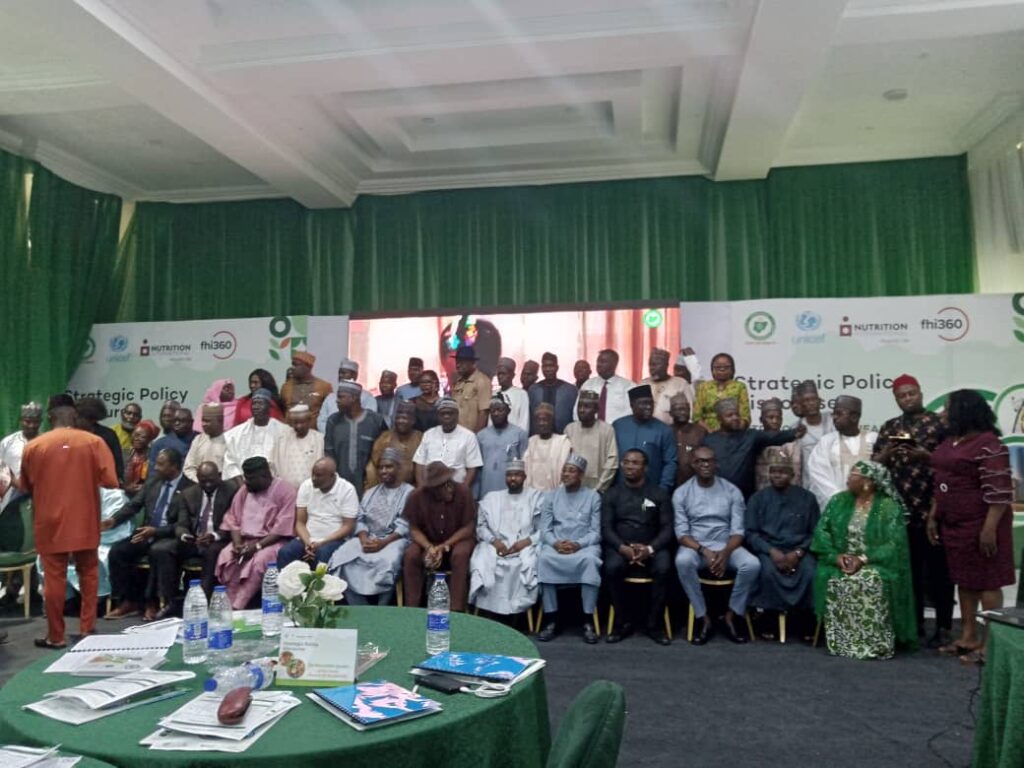To tackle Nigeria’s ongoing malnutrition crisis, the Civil Society Scaling-Up Nutrition in Nigeria (CS-SUNN) has called on lawmakers from 10 states to use their legislative powers to ensure effective funding and implementation of nutrition programmes across the country.
The organisation made this appeal during a two-day strategic policy dialogue held in Lagos from July 24 to 25 at the Dover Hotel, Ikeja. The forum, themed “Nutrition: Key to Health, Equity and Development in Nigeria,” brought together legislators, government officials, technical experts, and civil society leaders from Benue, Enugu, Cross River, Jigawa, Sokoto, Gombe, Adamawa, Katsina, Zamfara, and Yobe States.
Organised by CS-SUNN in collaboration with UNICEF, Nutrition International, and FHI 360, the event focused on how states can domesticate national nutrition policies and build strong frameworks for coordinated action at the sub-national level.
CS-SUNN’s Executive Secretary, Sunday Okoronkwo, emphasised that nutrition is not a matter of charity, but one of accountability and national development. He noted that while policies are in place, the absence of enabling laws and legislative oversight hinders implementation. Okoronkwo urged lawmakers to ensure that nutrition budget lines are created and fully released, that maternal leave is extended to six months, and that laws are passed to outlaw unbranded bulk oil and enforce food fortification standards. He also advocated for the establishment of Nutrition Departments within relevant MDAs and encouraged the use of the UNICEF-supported Child Nutrition Fund (CNF) to procure essential nutrition commodities such as micronutrient powders and Ready-to-Use Therapeutic Food (RUTF).
The lawmakers were further urged to allocate portions of their constituency funds to impactful nutrition interventions, including vitamin A supplementation, nutrition education, and maternal health outreach campaigns.
Dr. Osita Okonkwo, Country Director of Nutrition International, urged participants to look beyond short-term palliatives and focus on the broader scope of nutrition, including micronutrients, antenatal supplements, and long-term strategies for public health. He lamented that many states are yet to conduct the two Maternal, Newborn and Child Health (MNCH) weeks annually, even though vitamin A capsules are provided free of charge through partners. He highlighted that every one dollar invested in nutrition yields a return of sixteen dollars, underlining its central role in education, productivity, and poverty reduction.
Clara Nwakaego, Chairperson of the Enugu State Committee on Food and Nutrition, shared insights on her state’s commitment. She said the governor had recently approved the creation of a dedicated Nutrition Department to foster inter-ministerial coordination and improve partner alignment. She also revealed that in preparation for the 2024 World Breastfeeding Week in August, awareness campaigns will be rolled out in collaboration with women’s groups to promote exclusive breastfeeding.
A communiqué issued at the end of the dialogue highlighted several challenges facing nutrition delivery, including poor inter-agency coordination, inconsistent budget releases, and weak monitoring systems. CS-SUNN presented tools to support states in planning, allocating, and tracking nutrition expenditures more effectively.
Lawmakers in attendance pledged renewed commitment to improving nutrition governance. Notable signatories to the communiqué included Hon. Haruna Aliyu Dangyatin, Speaker of the Jigawa State House of Assembly; Hon. Tukur Bala, Speaker of the Sokoto State House of Assembly; and Hon. Dugori, Chairman of the Benue House Committee on Food.
Some states showcased significant progress during the forum. Jigawa has launched the Masaki Nutrition Initiative, with ₦500,000 allocated monthly per constituency, while lawmakers there have also committed ₦10 million each from their constituency development funds. Cross River has fully committed to providing counterpart funding for the Child Nutrition Fund and mandated a minimum of 4% of MDA budgets for nutrition, with plans to introduce demonstration farms for bio-fortified crops. Sokoto earmarked ₦100 million for the CNF and has budgeted ₦13 billion for primary healthcare in 2026. In Enugu, nutrition is being integrated into education through the introduction of SMART schools that provide pupils with meals and a daily egg. Gombe State has partnered with the private sector for the local production of fortified ‘Tom Brown’, while Katsina is scaling up production of RUTF through local agencies.
Despite these gains, participants agreed that much more needs to be done. Issues like delayed fund disbursement and inadequate coordination continue to hamper progress in many states.
Sunday Okoronkwo concluded the dialogue with a call to action. “Nutrition is infrastructure. It’s justice. It’s nation-building,” he said. “Let this not end in Lagos. Go back. Move motions. Pass laws. We’ll support you, but the leadership must come from within.”
As Nigeria strives to improve its nutrition indicators, the outcome of this forum may prove crucial in charting a healthier, more resilient, and economically empowered future.















